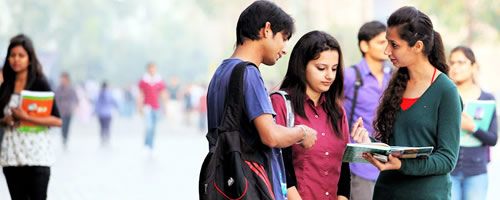BEd (curriculum)
The B.Ed. curriculum has been designed to integrate the study of subject knowledge, human development, pedagogical knowledge and communication skills. The programme shall comprise three broad curricular areas:
- Perspectives in Education
- Curriculum and Pedagogic Studies
- Engagement with the Field
The courses under each of these curricular areas will be based on a close reading of original writings, seminar/term paper presentations and continuous engagement with the field. Transaction of the courses shall be done using a variety of approaches, such as, case studies, discussions on reflective journals, observations of children, and interactions with the community in multiple socio-cultural environments. Information and Communication Technology (ICT), gender, yoga education, and disability/inclusive education forms an integral part of the B.Ed. curriculum.
Theory Courses
- Perspectives in Education
Perspectives in Education includes courses in the study of childhood, child development and adolescence, contemporary India and education, philosophical and sociological perspectives in education, theoretical foundations of knowledge and curriculum, teaching and learning, gender in the context of school and society, and inclusive education.
- Curriculum and Pedagogic Studies
Courses in Curriculum and Pedagogic Studies includes aspects of language across the curriculum and communication, understanding of a discipline, social history of a school subject, and its pedagogical foundations, with a focus on the learner; and a course on the theoretical perspectives on assessment for learning. Curriculum and Pedagogic Studies courses shall offer a study of the nature of a particular discipline, critical understanding of the school curriculum; pedagogy as the integration of knowledge about the learner, the discipline and the societal context of learning, and research relating to different aspects of young children's learning. The design of the programme would enable students to specialize in one disciplinary area, viz. Social Science, Science, Mathematics, Languages, and a subject area from the same discipline, at one/ two levels of school. The courses shall aim to develop in students an understanding of the curriculum, linking school knowledge with community life. A variety of investigative projects shall be included to reconstruct concepts from subject knowledge through appropriate pedagogic processes and to communicate meaningfully with children.
- Engagement with the Field/Practicum
The B.Ed. programme shall provide for sustained engagement with the Self, the Child, Community and School, at different levels and through establishing close connections between different curricular areas. This curricular area would serve as an important link between the above two broad curricular areas through its components:
- Tasks and Assignments that run through all the courses,
- School Internship.
- Courses on Enhancing Professional Capacities.
The curricular areas of ‘Perspectives in Education’ and ‘Curriculum and Pedagogic Studies’ shall offer field engagement through different tasks and projects with the community, the school, and the child in school and out-of-school. These tasks and projects would help in substantiating perspectives and theoretical frameworks studied in a teacher education classroom with field-based experiences. The tasks and projects may include collaborative partnership with the schools for developing CCE practices, establishing study circles forums for professional development of in-service school teachers, or dialoguing with the School Management Committee, etc. Community-based engagement may also include oral history projects with a community of artisans as part of ‘Contemporary India and Education’ or ‘Pedagogy of Social Science/History’. Likewise, the pedagogy course on science may include environment-based projects to address concerns of a particular village/city or a community.
Several specialized courses shall be offered to enhance professional capacities of a student-teacher such as courses on language and communication, drama and art, self-development and ICT. A course on critical understanding of ICTs shall be offered as an important curricular resource, according primacy to the role of the teacher, ensuring public ownership of digital resources, and promoting constructivist approaches that privilege anticipation and co-creation over mere access to ICTs. Courses that would focus on developing the professional and personal self of a teacher will be designed to integrate theoretical and practical components, transacted through focused workshops with specific inputs on art, music and drama. These courses shall offer opportunities to study issues of identity, interpersonal relations, adult-child gaps, personal and social constructs, schools as sites for struggle and social change; understanding and practicing yoga education, developing social sensitivity and the capacity to listen and emphasize.
School Internship
School Internship would be a part of the broad curricular area of 'Engagement with the Field' and shall be designed to lead to development of a broad repertoire of perspectives, professional capacities, teacher sensibilities and skills. The curriculum of B.Ed. shall provide for sustained engagement with learners and the school (including engaging in continuous and comprehensive assessment for learning), thereby creating a synergy with schools in the neighborhood throughout the year. Student-teachers shall be equipped to cater to diverse needs of learners in schools. These activities shall be organized for 4 weeks in the first year of the course. Students are to be actively engaged in teaching for 16 weeks in the final year of the course.
They shall be engaged at two levels, namely, upper primary (classes VIVIII) and secondary (IX-X), or senior secondary, with at least 16 weeks in secondary/senior secondary classes. They should be provided opportunities to teach in schools with systematic supervisory support and feedback from faculty.
Internship in schools will be for a minimum duration of 20 weeks for a two year programme (4 weeks in the first year, and 16 weeks in the second year as noted above). This should also include, besides practice teaching, an initial phase of one week for observing a regular classroom with a regular teacher and would also include peer observations, teacher observations and faculty observations of practice lessons.
